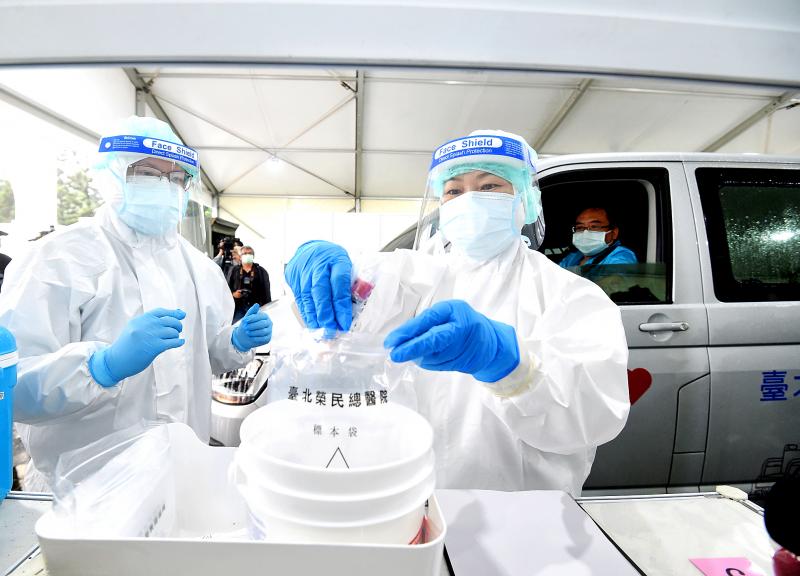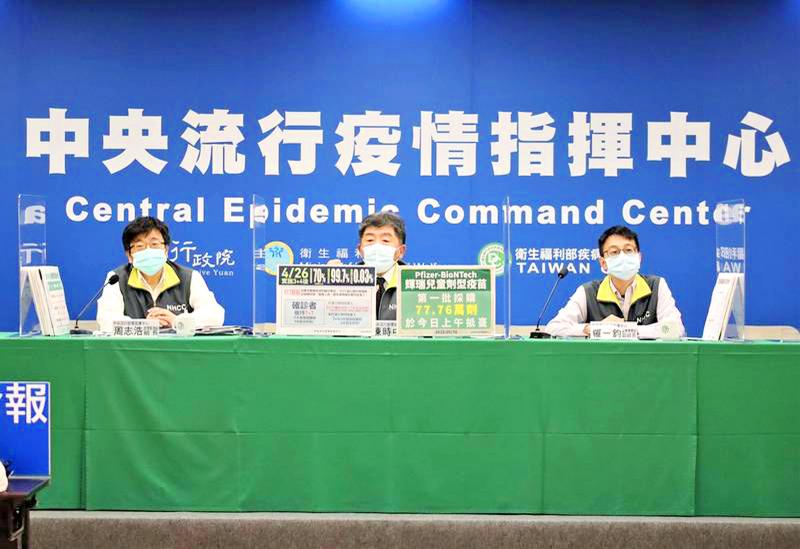Close contacts of COVID-19 cases who have received a booster shot no longer need to isolate at home, but should practice seven days of “self-disease prevention,” effective today, the Central Epidemic Command Center (CECC) said yesterday.
Minister of Health and Welfare Chen Shih-chung (陳時中), who heads the center, said that starting at 12am today, close contacts — people living in the same household — of those confirmed to be infected with COVID-19 are exempt from home isolation if they have received a booster shot of a COVID-19 vaccine.
Data from other countries show that people who have received a booster shot are at a reduced risk of severe illness from COVID-19 and are less infectious, he said, adding that the change allows close contacts with a booster shot to continue working.

Photo: Pin Fang-chao, Taipei Times
Close contacts would no longer be required to follow the “3+4” policy — isolate at home for three days and practice self-disease prevention for four days — but would need to follow a “0+7” policy — practice self-disease prevention for seven days.
Avoiding unnecessary outings, people following self-disease prevention must test negative with a rapid COVID-19 test within two days of leaving home, he said, adding that they must wear a mask and practice social distancing while away from home.
They are barred from dining in at restaurants, attending group meals or gatherings, and going to crowded venues or places where they might have direct contact with strangers, he added.

Photo courtesy of the Central Epidemic Command Center
Close contacts who have not received a booster shot are still required to follow the “3+4” policy, Chen said.
Confirmed cases are still required to quarantine for seven days, followed by seven days of self-health management, he added.
Starting tomorrow, people who are 65 or older and not under home quarantine, home isolation or self-disease prevention, but who test positive with a rapid COVID-19 test, can be diagnosed as a confirmed case by a doctor and prescribed the oral antiviral Paxlovid, he said.
Those aged 65 or older who test positive with a rapid test can bring the test kit to a nearby healthcare facility or show it during a telemedicine consultation, and ask the doctor to assess the result, Chen added.
If the patient and the doctor agree on the result, the doctor can report the patient as a confirmed COVID-19 case and evaluate whether Paxlovid should be prescribed.
If they disagree, the doctor can arrange for the patient to receive a polymerase chain reaction test or another rapid test.
People under home quarantine, home isolation or self-disease prevention who test positive with a rapid COVID-19 test and are eligible for a Paxlovid prescription — having met one of the 14 criteria showing that they have a higher risk of contracting the virus — can also receive a prescription from a doctor through a telemedicine consultation, he said.
Taiwan yesterday reported 61,697 new local COVID-19 infections and 29 deaths.
Centers for Disease Control (CDC) Director-General Chou Jih-haw (周志浩), head of the CECC’s disease surveillance division, said that 28 of the people who died had cancer, a catastrophic illness or underlying health conditions.
Sixteen of those who died (57 percent) were unvaccinated, while 23 (79 percent) had not received a booster shot, Chou said, adding that 17 of them were aged 80 or older.
CDC Deputy Director-General Philip Lo (羅一鈞), deputy head of the CECC’s medical response division, said that of 126 new cases with moderate symptoms, 57 (45 percent) were unvaccinated and of 22 new cases with severe symptoms, 11 (50 percent) were unvaccinated.
Taiwan had followed a “zero COVID” strategy because previous variants of SARS-CoV-2 had higher fatality rates, but as the Omicron variant has a significantly lower fatality rate, the nation is easing restrictions and learning to live with COVID-19, Lo said.
Asked whether confirmed cases who test positive after seven days of isolation can be infectious, Lo said studies suggest that the chance of a confirmed case being infectious after 10 days is near zero, while a Japanese study suggests that a virus culture is possible in 11 percent of cases after seven days of isolation.
A study from Singapore suggests that a virus culture is rarely possible in cases after five days of isolation, so only about 5 percent of cases would be infectious after seven days of isolation, he added.

NATIONAL SECURITY THREAT: An official said that Guan Guan’s comments had gone beyond the threshold of free speech, as she advocated for the destruction of the ROC China-born media influencer Guan Guan’s (關關) residency permit has been revoked for repeatedly posting pro-China content that threatens national security, the National Immigration Agency said yesterday. Guan Guan has said many controversial things in her videos posted to Douyin (抖音), including “the red flag will soon be painted all over Taiwan” and “Taiwan is an inseparable part of China,” while expressing hope for expedited “reunification.” The agency received multiple reports alleging that Guan Guan had advocated for armed reunification last year. After investigating, the agency last month issued a notice requiring her to appear and account for her actions. Guan Guan appeared as required,

Japan and the Philippines yesterday signed a defense pact that would allow the tax-free provision of ammunition, fuel, food and other necessities when their forces stage joint training to boost deterrence against China’s growing aggression in the region and to bolster their preparation for natural disasters. Japan has faced increasing political, trade and security tensions with China, which was angered by Japanese Prime Minister Sanae Takaichi’s remark that a Chinese attack on Taiwan would be a survival-threatening situation for Japan, triggering a military response. Japan and the Philippines have also had separate territorial conflicts with Beijing in the East and South China

A strong cold air mass is expected to arrive tonight, bringing a change in weather and a drop in temperature, the Central Weather Administration (CWA) said. The coldest time would be early on Thursday morning, with temperatures in some areas dipping as low as 8°C, it said. Daytime highs yesterday were 22°C to 24°C in northern and eastern Taiwan, and about 25°C to 28°C in the central and southern regions, it said. However, nighttime lows would dip to about 15°C to 16°C in central and northern Taiwan as well as the northeast, and 17°C to 19°C elsewhere, it said. Tropical Storm Nokaen, currently

PAPERS, PLEASE: The gang exploited the high value of the passports, selling them at inflated prices to Chinese buyers, who would treat them as ‘invisibility cloaks’ The Yilan District Court has handed four members of a syndicate prison terms ranging from one year and two months to two years and two months for their involvement in a scheme to purchase Taiwanese passports and resell them abroad at a massive markup. A Chinese human smuggling syndicate purchased Taiwanese passports through local criminal networks, exploiting the passports’ visa-free travel privileges to turn a profit of more than 20 times the original price, the court said. Such criminal organizations enable people to impersonate Taiwanese when entering and exiting Taiwan and other countries, undermining social order and the credibility of the nation’s